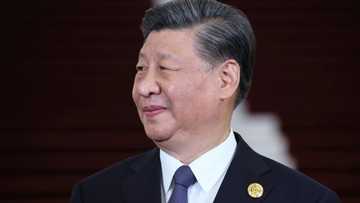Stocks slide, oil holds gains on Middle East, economy concerns

Source: AFP
PAY ATTENTION: Click “See First” under the “Following” tab to see Legit.ng News on your Facebook News Feed!
Asian stocks sank Thursday, tracking a retreat on Wall Street fuelled by a surge in US Treasuries and worries over a possible escalation of the Middle East crisis, which also helped oil hold the previous day's rally.
Disappointing corporate reports from US tech titans added to the sense of gloom among investors, while the burst of optimism that greeted China's massive spending pledge this week began to fade.
A warning from Israeli Prime Minister Benjamin Netanyahu that a ground invasion of Gaza was being prepared fanned a rush to safe-haven assets and sent crude up more than two percent Wednesday, with traders concerned about supplies from the crude-rich region.
The commodity had seen prices slip in recent days on hope Israel was recalibrating its plans as Palestinian militants Hamas continues to release hostages.
The spike sent 10-year treasury yields -- seen as a proxy for future interest rates -- surging back towards five percent, and putting pressure on the Federal Reserve as it tries to battle inflation while attempting to avoid tipping the economy into recession.
Data later in the day is expected to show US gross domestic product expanded heartily in the third quarter but there is a worry that with borrowing costs at two-decade highs and oil elevated, a contraction could come in the new year.
PAY ATTENTION: Share your outstanding story with our editors! Please reach us through info@corp.legit.ng!
That comes amid a corporate reporting season that saw Facebook parent Meta warn about the outlook next year, Google parent Alphabet post disappointing cloud figures and Texas Instruments issue bearish forecasts.
"The question now turns to earnings as earnings drive stock prices," said Howard Ward, chief investment officer of Growth Equities and portfolio manager at Gabelli Funds.
"This is where the rubber meets the road. A recession would result in higher unemployment, less consumer spending, slower gross domestic product growth and lower earnings, which implies lower stock prices."
The Fed's next meeting at the end of the month will be keenly followed by investors, hoping for some guidance on rates going into 2024.
A plunge in Alphabet and Texas, as well as Amazon ahead of its report later Thursday, hit Wall Street, with the tech-rich Nasdaq tanking more than two percent.
Asia fared barely any better, with Tokyo and Seoul each down more than two percent, while Sydney, Singapore, Taipei, Wellington, Jakarta and Manila were also in the red.
Hong Kong and Shanghai were back in negative territory as Wednesday's rally -- fuelled by China's move to pump more than $100 billion into infrastructure spending -- petered out.
Traders are keeping close tabs on Japanese authorities as the yen sits at a one-year low against the dollar, with Finance Minister Shunichi Suzuki saying officials were watching currency moves with a high sense of urgency.
Bets are rising on an intervention if the yen goes near the 151.95 per dollar that sparked a move last year.
The currency's weakness comes as the Bank of Japan refuses to move away from its ultra-loose monetary policy, even as the Fed warns it could hike further or keep rates high for some time.
The BoJ is facing calls to tweak its yield-curve control policy, which allows bond rates to move only within a certain narrow band.
"The yen's persistent weakness also adds pressure on the BoJ's policy settings, whether or not to raise the ceiling for yield-curve control, remove YCC or end the negative policy rate," said Koji Fukaya, at Market Risk Advisory.
However, he added that the unit would likely be kept from moving much higher by the prospect of intervention, but kept weaker by the massive difference between the Fed and BoJ rates.
Key figures around 0230 GMT
Tokyo - Nikkei 225: DOWN 2.1 percent at 30,602.44 (break)
Hong Kong - Hang Seng Index: DOWN 0.8 percent at 16,957.27
Shanghai - Composite: DOWN 0.4 percent at 2,961.12
Dollar/yen: UP at 150.39 yen from 150.08 yen on Wednesday
Euro/dollar: DOWN at $1.0547 from $1.0572
Pound/dollar: DOWN at $1.2084 from $1.2114
Euro/pound: UP at 87.29 pence from 87.25 pence
West Texas Intermediate: DOWN 0.2 percent at $85.24 per barrel
Brent North Sea crude: DOWN 0.2 percent at $89.94 per barrel
New York - Dow: DOWN 0.3 percent at 33,035.93 (close)
London - FTSE 100: UP 0.3 percent at 7,414.34 (close)
Source: AFP






